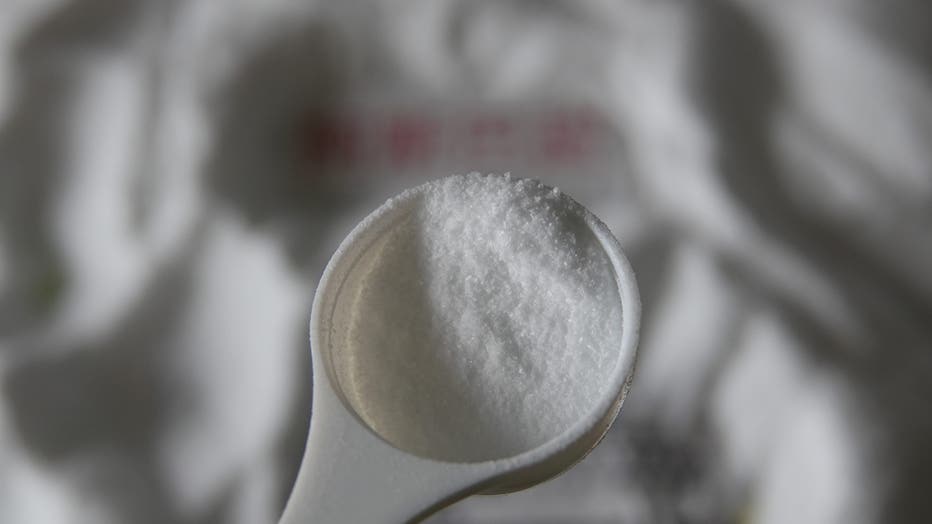Heart attack risk could rise with artificial sweetener consumption, study finds
A common artificial sweetener has been linked to an increased risk of heart attacks and strokes, according to a new study from Cleveland Clinic.
Erythritol, a sugar alcohol that is used to sweeten many low-sugar, reduced-calorie drinks and foods — particularly in low-carb or "keto" diets — was found to cause a spike in blood platelets and blood clot formation, researchers say.
The findings were published in the journal Arteriosclerosis, Thrombosis and Vascular Biology.
The team’s previous study, which appeared in Nature Medicine, found that heart patients with high levels of erythritol in their system had double the risk of experiencing a major cardiac event within three years.
"In this study, we directly compared drinking a sweetened drink with either 30 grams of glucose, which is sugar, or 30 grams of erythritol," senior author Stanley Hazen, M.D., PhD, co-section head of preventive cardiology at Cleveland Clinic, said in a video provided to Fox News Digital.

A common artificial sweetener has been linked to an increased risk of heart attacks and strokes, according to a new study from Cleveland Clinic. (Photo credit should read CFOTO/Future Publishing via Getty Images)
The small study consisted of 20 healthy volunteers, averaging 30 years of age, whose blood was drawn after an overnight fast.
The participants drank water mixed with either 30 grams of erythritol (comparable to the dose in an artificially sweetened soda or baked good) or 30 grams of glucose.
REGULAR SUGAR VS. ARTIFICIAL SWEETENER: IS ONE WORSE FOR YOU THAN ANOTHER? EXPERTS CHIME IN
After 30 minutes, another blood draw assessed the participants’ plasma levels of erythritol as well as platelet function.
Those who consumed the artificial sweetener were found to have more than 1,000 times the erythritol level of those who consumed sugar.
"There is every reason to believe that after drinking the erythritol, there is a heightened risk of clotting, or thrombosis" — which could heighten the chances of heart attack or stroke, Hazen said.
That effect was not seen with the patients who drank glucose.
"Based on the current data, it looks like it’s safer to drink a glucose-sweetened drink rather than an erythritol-sweetened drink," Hazen said.
"I recommend my patients avoid the artificial sweeteners and sugar substitutes, to try to eat whole foods, to stay away from processed foods and to shop the produce section."
For those who do want to sweeten a food or drink, Hazen would recommend — based on the data — using honey or fruit instead of artificial sweetener.
This same effect has been observed with other sugar alcohols, the doctor noted.
Erythritol is classified by the U.S. Food and Drug Administration (FDA) and the European Food Safety Authority as GRAS ("generally recognized as safe").
SUGAR SUBSTITUTES NOT ADVISED FOR WEIGHT LOSS OR DISEASE PREVENTION, SAYS WORLD HEALTH ORGANIZATION
Other than the "bare minimum," there is no mandate in place for this to be tested for safety, Hazen said.
"I would like to see regulatory bodies reevaluate the safety of the use of sugar alcohols."
Further clinical studies are needed to measure the long-term cardiovascular safety of erythritol, according to the researchers.
Dr. Bradley Serwer, a cardiologist and chief medical officer at VitalSolution, a Cincinnati, Ohio-based company that offers cardiovascular and anesthesiology services to hospitals, was not involved in the study but said that it raises "significant concerns."
"Many artificial sweeteners have been studied and historically have been sold as healthy alternatives to sugar, but they have often been found to have significant side effects," he told Fox News Digital.
"There have been other studies showing that erythritol increases platelet activity, which leads to abnormal blood clot formation."
Several other sugar substitutes, such as xylitol, have also been linked to adverse health consequences, according to Serwer.
"In addition to increasing the risk of cardiovascular events, these artificial sugars often trick the body into producing more insulin," he noted.
"Insulin increases sweet cravings, so people crave more sugar after eating artificial sweeteners, thus causing a negative impact that can lead to metabolic syndrome."
In his cardiology practice, Serwer said his patients often seek healthier alternatives to high-calorie, sugary foods.
"It is important to inform them that it may be better to avoid these sugar alcohols altogether," the cardiologist said.
He said he hoped "this data will cause the FDA to reevaluate the safety of erythritol."
Industry group urges ‘extreme caution’
The Calorie Control Council (CCC), an international association that represents the low- and reduced-calorie food and beverage industry, advised consumers to interpret Cleveland Clinic’s study with "extreme caution."
CLICK HERE TO SIGN UP FOR OUR HEALTH NEWSLETTER
"The limited number of participants were given an excessive amount of erythritol, nearly double to triple the maximum amount approved in any single beverage in the United States based on a standard 8-16 oz serving," Carla Saunders, president of the Washington, D.C.-based CCC, said in a statement sent to Fox News Digital.
Erythritol levels were only measured once after consumption, she pointed out.
"The pilot lacked control over lifestyle factors that may affect the outcome, which could introduce confounding variables and impact the reliability of the findings," Saunders added.
For more Health articles, visit www.foxnews/health
"Further, as erythritol levels were only measured at baseline and 30 minutes after consumption, there is no way to demonstrate any lasting effect of excessive consumption on any health outcome," she also said.
"For 30 years, science has shown that erythritol is a proven safe and effective choice for sugar and calorie reduction."
Fox News Digital contacted Cleveland Clinic for comment on the CCC's position.

